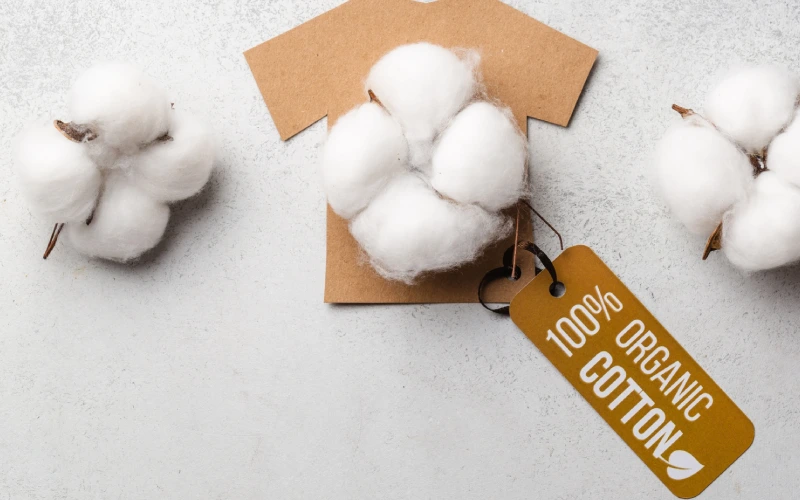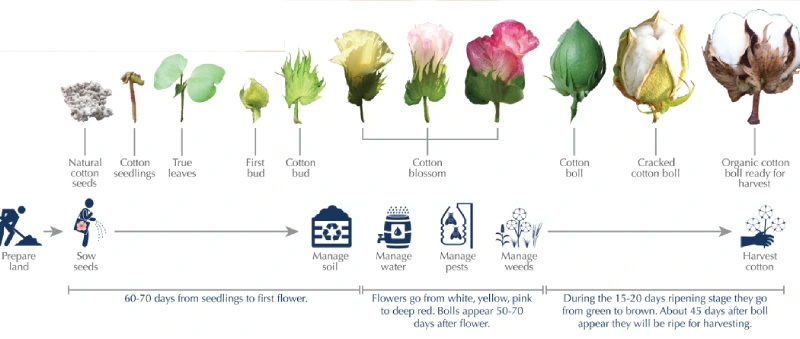Grown without chemicals, organic cotton is used for eco-friendly clothing, babywear, bedding, and hygiene products. The market is booming due to rising demand for sustainable fashion (expected to hit $6.73 billion by 2025). Brands and consumers prefer it for softness, biodegradability, and low environmental impact.
Exactly What is Organic Cotton?

Alright, let’s get real for a second. You’ve probably seen the word “organic” plastered all over everything—from apples to almond milk—and now, even your pajamas. But what does organic cotton really mean?
In the simplest terms, organic cotton is grown without using synthetic pesticides, herbicides, or genetically modified seeds. Instead, it relies on natural methods—crop rotation, composting, and beneficial insects—to grow clean, chemical-free cotton.
But hey, don’t just take our word for it. According to Wikipedia, organic cotton is “cotton from plants not genetically modified and grown without the use of any synthetic agricultural chemicals such as fertilizers or pesticides.” That’s a pretty technical way of saying: it’s the natural way your great-grandparents probably farmed cotton—before things got industrialized.
As a sleepwear manufacturer, we care a lot about what touches your skin for 8 hours a night. Cotton that hasn’t been sprayed with harsh chemicals? Yes, please! And guess what? Our customers thank us for that every single day.
Organic cotton isn’t just a feel-good label—it’s a commitment to healthier people, happier farmers, and a more sustainable planet. And trust us, once you sleep in organic cotton pajamas, it’s hard to go back.
How Organic Cotton Differs from Conventional Cotton
| Category | Organic Cotton | Conventional Cotton |
|---|---|---|
| Farming Methods | No synthetic pesticides/GMOs; natural fertilizers & pest control | Heavy use of pesticides, synthetic fertilizers, and GMO seeds |
| Water Usage | Rain-fed (saves ~91% water) | High irrigation demand |
| Soil Health | Preserves biodiversity; sustainable long-term | Soil degradation; chemical residue risks |
| Fiber Quality | Softer, hypoallergenic (ideal for sensitive skin) | May retain chemicals; higher allergy risk |
| Environmental Impact | 98% less water pollution; low carbon footprint | Pollutes waterways (16% of global pesticides) |
| Production Cost | Higher (manual weeding/crop rotation) | Low-cost (chemical-dependent yields) |
| Certification | Requires standards (e.g., GOTS, OCS) | No eco-certification required |
| Market Price | 20-50% premium (sustainability-driven) | Cheap but hidden ecological costs |
| Primary Uses | Babywear, eco-fashion, medical textiles | Fast fashion, budget textiles |
Let’s compare the two cousins: organic vs. conventional cotton. On the surface, they may look the same, but dig a little deeper, and you’ll see they couldn’t be more different.
Conventional cotton farming uses a cocktail of synthetic fertilizers and pesticides. These chemicals do a number on the environment and—believe it or not—on the fabric itself. The result? Stiffer, less breathable, and sometimes irritating fabric. It’s efficient for mass production, but not so friendly for your skin or the earth.
Now, organic cotton? It’s nurtured with care. No chemicals. No GMOs. Just pure, natural cotton grown using methods that actually replenish the soil rather than strip it. The fabric? Incredibly soft. Breathable. It naturally absorbs moisture and allows your skin to breathe.
One of our long-time wholesale clients from Germany told us, “Since switching to organic cotton pajamas, returns due to skin irritation have dropped to nearly zero. Our customers even report better sleep!” That’s real feedback from real people—and we hear it more often than you’d think.
The difference isn’t just in the farming; it’s in the feel, the performance, and the peace of mind it brings. And as manufacturers, we feel good knowing that our products do no harm.
Definitions from Global Standards: GOTS, USDA Organic, and More
Now, let’s cut through the marketing fluff and talk standards—because not all “organic cotton” is created equal. As professional sleepwear manufacturers, we don’t just trust a label slapped onto a bale of cotton. We rely on rigorous, globally recognized certifications to ensure our materials meet the highest benchmarks.
GOTS – The Gold Standard
First up: the Global Organic Textile Standard (GOTS). According to the official GOTS website, GOTS is “the worldwide leading textile processing standard for organic fibers, including ecological and social criteria.” In simpler terms? If your cotton has the GOTS seal, it’s the real deal—from farm to fabric.
GOTS-certified cotton isn’t just grown without chemicals—it’s also processed and manufactured under strict environmental and social conditions. That means no toxic dyes, no child labor, and a clear, traceable supply chain.
As a pajama manufacturer, we’ve gone through the GOTS certification process ourselves. It’s intense—but worth it. It assures our wholesale partners and customers that we’re serious about sustainability and ethics.
USDA Organic & OEKO-TEX®: Other Important Certifications
In the United States, USDA Organic certification confirms the cotton is grown without synthetic pesticides or GMOs. It’s an agricultural standard—so it tells you about how the cotton was grown, but not necessarily how it was processed. That’s where GOTS comes in to fill the gap.
Another big name in textile safety is OEKO-TEX® Standard 100. This certification isn’t specific to organic cotton, but it guarantees that every component of the product—threads, buttons, and all—is free from harmful substances.
When we combine GOTS with OEKO-TEX® in our pajamas, our clients often tell us, “It’s like wrapping yourself in integrity and comfort all at once.”
The Story Behind Organic Cotton: From Seed to Sleepwear
Let’s take a walk down the supply chain and see how organic cotton turns from a seed into that cozy pair of pajamas you snuggle into at night.
How Organic Cotton is Grown: Nature’s Clean Process

The journey begins with the seed—an untreated, non-GMO seed planted in healthy, chemical-free soil. Organic farmers rotate crops, use compost, and embrace nature’s own pest control (like ladybugs!) to maintain balance. According to Textile Exchange, organic cotton farming uses 91% less water and emits 46% fewer greenhouse gases than conventional farming. That’s not just sustainable—that’s revolutionary.
Unlike conventional farms, organic cotton fields are buzzing with biodiversity. You’ll see insects, birds, and even healthy weeds. It’s an ecosystem, not a factory.
We’ve visited these farms ourselves. The difference is visible—the soil is rich, the plants are robust, and the farmers? They’re proud. Many of them tell us they feel safer and more respected working in organic fields, away from toxic chemicals.
Harvesting & Production: A Manufacturer’s Real-World Insight
After harvesting, organic cotton goes through a mechanical ginning process—no harsh chemicals involved. From there, it’s spun, woven, and dyed using low-impact, environmentally friendly methods.
At our factory, we personally oversee the production process from start to finish. We work only with certified dye houses and spinners. That attention to detail shows up in the final product—pajamas that are not only beautiful but breathable, durable, and unbelievably soft.
We’ve had retailers tell us our organic cotton sleepwear “sells itself” once customers touch it. That tactile proof—that touch of authenticity—is what makes all the difference.
Why We Choose Organic Cotton for Our Pajamas

Let’s be honest. We didn’t switch to organic cotton just to ride the eco-trend. We did it because, as manufacturers, we want to stand behind a product we’re proud of.
The Skin-Friendly Benefits: What Our Clients Say
Imagine sleeping in something that’s not just soft, but safe. No lingering pesticide residues. No synthetic finishes. Just clean, natural cotton—pure enough for a baby’s skin.
We’ve heard stories from customers with sensitive skin, eczema, or allergies who switched to our organic cotton pajamas and never looked back. One mom even said her daughter’s sleep improved because she wasn’t itching through the night. That’s powerful.
Softness That Speaks for Itself: What Sleepwear Should Feel Like
There’s something special about the softness of organic cotton. It has a natural, gentle texture—no stiffness or starch. That’s because the fibers aren’t damaged by chemicals during processing.
Our manufacturing team noticed this too. When we first handled organic cotton yarns, the difference was unmistakable. Softer, silkier, and with better breathability.
And when customers try them on? The response is almost always the same: “Wow.”
Is Organic Cotton Really Better? A Practical Comparison
It’s one thing to talk about sustainability and softness—but let’s put organic cotton to the test against its conventional counterpart.
Environmental Impact: Saving Water, Soil & Wildlife
Here’s a jaw-dropper: conventional cotton farming accounts for 16% of global insecticide use, according to the World Wildlife Fund (WWF). Organic cotton, on the other hand, supports healthier soil, cleaner waterways, and wildlife biodiversity.
We’ve seen farms where switching to organic brought back bees and butterflies—literally. Those tiny signs of life are proof that organic methods work in harmony with nature.
Health & Safety for Workers and End Users
Cotton farmers in developing countries often suffer from exposure to pesticides. Organic farming removes that risk, offering safer working conditions. As a manufacturer, we also protect our own workers by choosing safer, less toxic production inputs.
And let’s not forget the end users—you, the sleepers. When you choose organic cotton pajamas, you’re not just being kind to the planet. You’re protecting your own skin, your family, and your health.
Conclusion
We’ve spent years perfecting our craft as sleepwear manufacturers, and if there’s one thing we’ve learned, it’s this: what you sleep in matters.
Organic cotton isn’t just about being trendy. It’s about making intentional, ethical, and sustainable choices—ones that benefit your skin, your conscience, and our shared environment.
From sourcing to stitching, we pour our expertise and care into every set of pajamas. And we’ve watched firsthand how these choices ripple out—into better sleep, happier customers, and a healthier world.
So whether you’re a boutique looking for a supplier, a family seeking safer clothes, or just curious about the buzz—know this: when you choose organic cotton pajamas from a trusted manufacturer like us, you’re choosing comfort with purpose.
We’re honored to be part of that journey with you.

